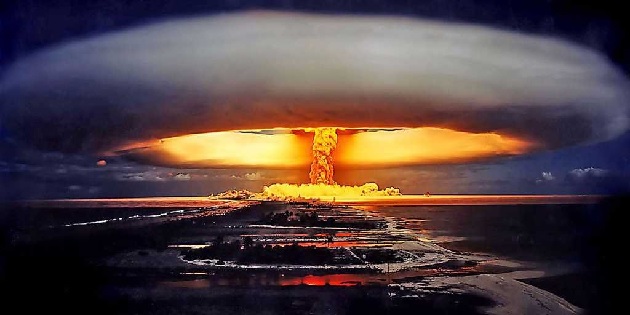Despite making good progress on stopping the proliferation of nuclear arms, the world is facing a growing threat of nuclear war among hostile states as well as misuse of nuclear weapons by extremists who are trying to have access to these arsenals.
With an aim to make world leaders more conscious of dangers associated with nuclear terrorism threat and evolve failsafe strategies to save nuclear technology from going into the hands of terror groups, the holding of the Nuclear Security Summit (NSS) in Washington is a commendable step. Such high level gatherings need to be held on regular intervals with a goal for tangible results for the cause of humanity.
The NSS is focused on efforts to lock down vulnerable atomic materials to prevent nuclear terrorism. During the summit, President Barack Obama has warned world leaders that they should not be complacent against the growing and persistent threat of nuclear terrorism. He urged them to do more to safeguard vulnerable nuclear facilities as well as to prevent “madmen” belonging to groups like the Islamic State (IS) and al-Qaeda from getting their hands on an atomic weapon or a radioactive ‘dirty’ bomb.
While representing Pakistan at the summit, Minister of State for Foreign Affairs Tariq Fatemi, pleaded his government’s stance on nuclear security. He said that Pakistan attaches great importance to strengthening global nuclear security and fully shares global concern that nuclear materials and facilities must never fall into the wrong hands.
On different occasions, the US and India have made propaganda about the vulnerability of Pakistan’ nuclear security paradigm, expressing fears that nuclear arms could be stolen by terrorists. It is Pakistan government and military establishment’s reiterated message to the world that Pakistan’s nuclear programme has a solid, multi-layered safeguard mechanism.
Presently, the world is facing two-pronged threat of falling victim to destruction caused by nuclear warfare. First, certain states with nuclear capability pose a threat to world peace. Those states that fail to resolve their conflicts through dialogues can get engaged in nuclear warfare anytime: that is the perceived fear. If that happens, it will be no less than mutually agreed destruction for both sides.
The example of Pakistan and India can be cited in this regard whose political and military leadership have often, in incredibly reckless machismo, talked about using the nuclear bomb.
Moreover, North Korea’s nuclear defiance and Russia’s non-cooperative attitude as well as the US policy of maintaining its hegemony in the world are causes for concern. The US and Russia have a combined arsenal of 14,800 nuclear weapons, and there is an estimated total of 15,800 nuclear weapons in existence worldwide.
Second, terror groups in the Middle East, Afghanistan and even home-based militants in Pakistan are a constant threat to the security of nuclear stockpiles. Nuclear war could yield an unprecedented human death toll and habitat destruction. Detonating such a large amount of nuclear weaponry would have a long-term effect on the world’s climate that may generate significant upheaval in advanced civilisations.
Nobody is oblivious of the terrible consequences of using nuclear weapons. Therefore, these weapons should never be used in any case. All states should cooperate and follow nuclear agreements in letter and spirit for the sake of humanity.







